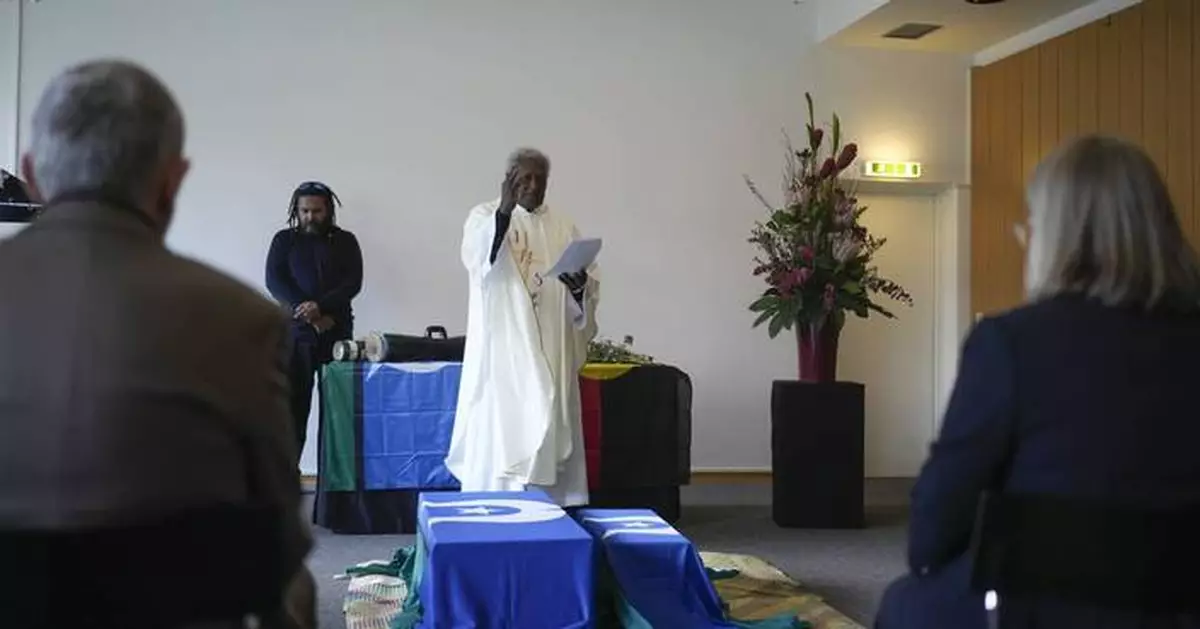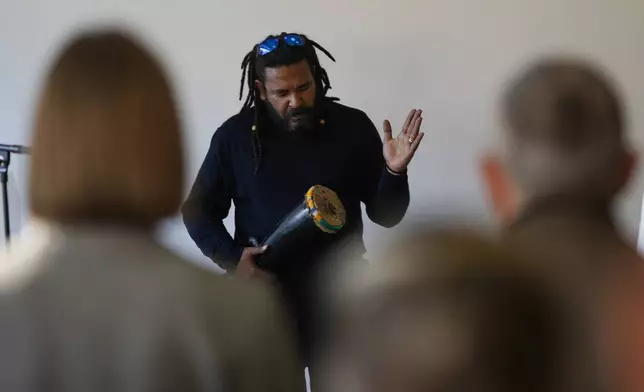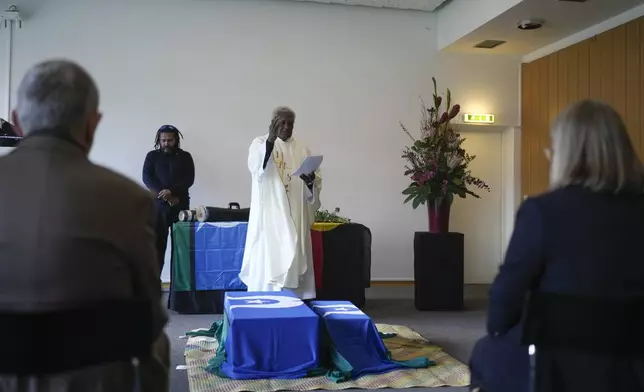BERLIN (AP) — Five sets of ancestral remains from Australia that had been in German museum collections since the 19th century were handed back at a ceremony Thursday that a community representative described as a sad but “very joyful” moment.
The restitution is part of ongoing efforts by German museums and authorities to return human remains and cultural artifacts that were taken during colonial times.
Click to Gallery
Yessie Mosby from Ugar Island in Australia blows the shell behind coffins, during a ceremony for the return of Aboriginal Australians ancestors to their relatives and communities at the Ethnological Museum in Berlin, Germany, Thursday, Dec. 5, 2024. (AP Photo/Markus Schreiber)
Two coffins lie on a traditional mat during a ceremony for the return of Aboriginal Australians' ancestors to their relatives and communities at the Ethnological Museum in Berlin, Germany, Thursday, Dec. 5, 2024. (AP Photo/Markus Schreiber)
From left: The Australien Ambassador to Germany Natasha Smith and the elders from the Ugar Island, Tomson Stephen, center and Father Daniel Stephen, right, sign documents next to the coffins, during a ceremony for the return of Aboriginal Australians ancestors to their relatives and communities at the Ethnological Museum in Berlin, Germany, Thursday, Dec. 5, 2024. (AP Photo/Markus Schreiber)
Yessie Mosby from Ugar Island in Australia carries a coffin, after a ceremony for the return of Aboriginal Australians ancestors to their relatives and communities at the Ethnological Museum in Berlin, Germany, Thursday, Dec. 5, 2024. (AP Photo/Markus Schreiber)
Yessie Mosby from Ugar Island in Australia claps on a drum during a ceremony for the return of Aboriginal Australians ancestors to their relatives and communities at the Ethnological Museum in Berlin, Germany, Thursday, Dec. 5, 2024. (AP Photo/Markus Schreiber)
Yessie Mosby from Ugar Island in Australia blows the shell behind coffins, during a ceremony for the return of Aboriginal Australians ancestors to their relatives and communities at the Ethnological Museum in Berlin, Germany, Thursday, Dec. 5, 2024. (AP Photo/Markus Schreiber)
Father Stephen of Ugar Island, Australia, blesses coffins during a ceremony for the return of Aboriginal Australians' ancestors to their relatives and communities at the Ethnological Museum in Berlin, Germany, Thursday, Dec. 5, 2024. (AP Photo/Markus Schreiber)
In this case, three sets of remains that had been in Berlin since 1880 were handed over along with two other sets of remains held in the northwestern German city of Oldenburg. Four representatives of the Ugar Island community, part of the Torres Strait Islands off the northeastern tip of Australia, traveled to Berlin to honor their ancestors and accompany their remains on their journey home.
“These ancestral remains were never meant to be here,” said Hermann Parzinger, the head of the Prussian Cultural Heritage Foundation, which oversees Berlin's state museums.
“They're here because, during the colonial era and beyond, Europeans presumed to make other peoples and cultures the subject, or more often object, of their research — appropriating artifacts from cultures outside Europe on a scale that is almost unimaginable today and even desecrating the burial places of those communities in the process,” he said.
Around the turn of the 20th century, he added, Berlin museums set up a network of scientists, travelers, traders and others who sent back cultural items from around the world, and “in racing to compete with the other major European museums, they all too often disregarded the humanity and dignity of the peoples they encountered.”
The restitution of the remains from Berlin's Ethnological Museum and the State Museum for Nature and Man in Oldenburg means that 162 sets of ancestral remains have now been returned to Australia from Germany, and about 1,700 from around the world, said Natasha Smith, Australia's ambassador to Germany. She said the returns are “an extremely high priority” for Aboriginal and Torres Strait Islander communities and the government.
“It's sad, but it's a very joyful moment,” Ugar Island representative Rocky Stephen said at the ceremony honoring the ancestors. “This is a process of healing that's going to happen when they return back to us.”
“No matter (if) it was nearly a 40-hour journey to travel here, because it's been 144 years they have been missed back at their home,” he said.
Berlin's museums now aim to do “everything we can to make the repatriation possible” of remains whose countries and communities of origin can be identified and want to bring them home, Parzinger said.
More broadly, governments and museums in Europe and North America have increasingly sought to resolve ownership disputes over objects looted during colonial times.
In 2022, for example, Germany and Nigeria signed an agreement paving the way for the return of hundreds of artifacts known as the Benin Bronzes taken from Africa by a British colonial expedition more than 120 years ago.
Geir Moulson in Berlin contributed to this report.
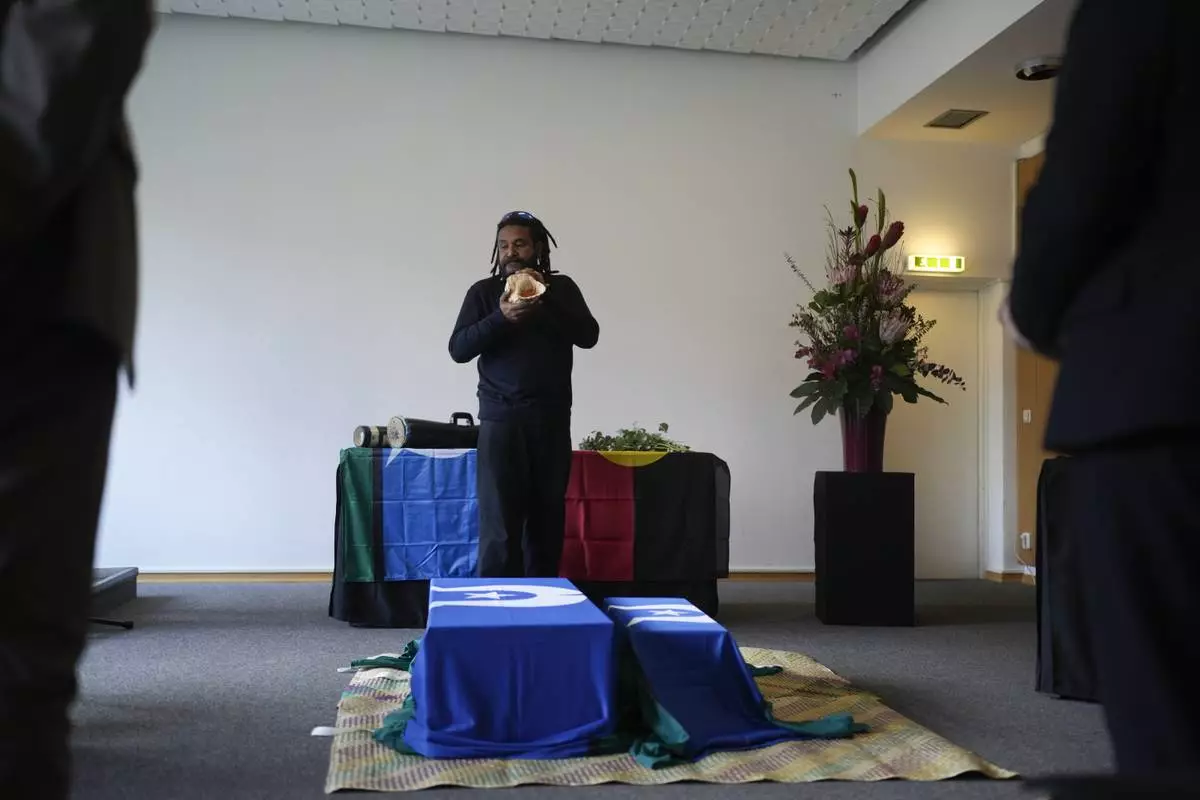
Yessie Mosby from Ugar Island in Australia blows the shell behind coffins, during a ceremony for the return of Aboriginal Australians ancestors to their relatives and communities at the Ethnological Museum in Berlin, Germany, Thursday, Dec. 5, 2024. (AP Photo/Markus Schreiber)
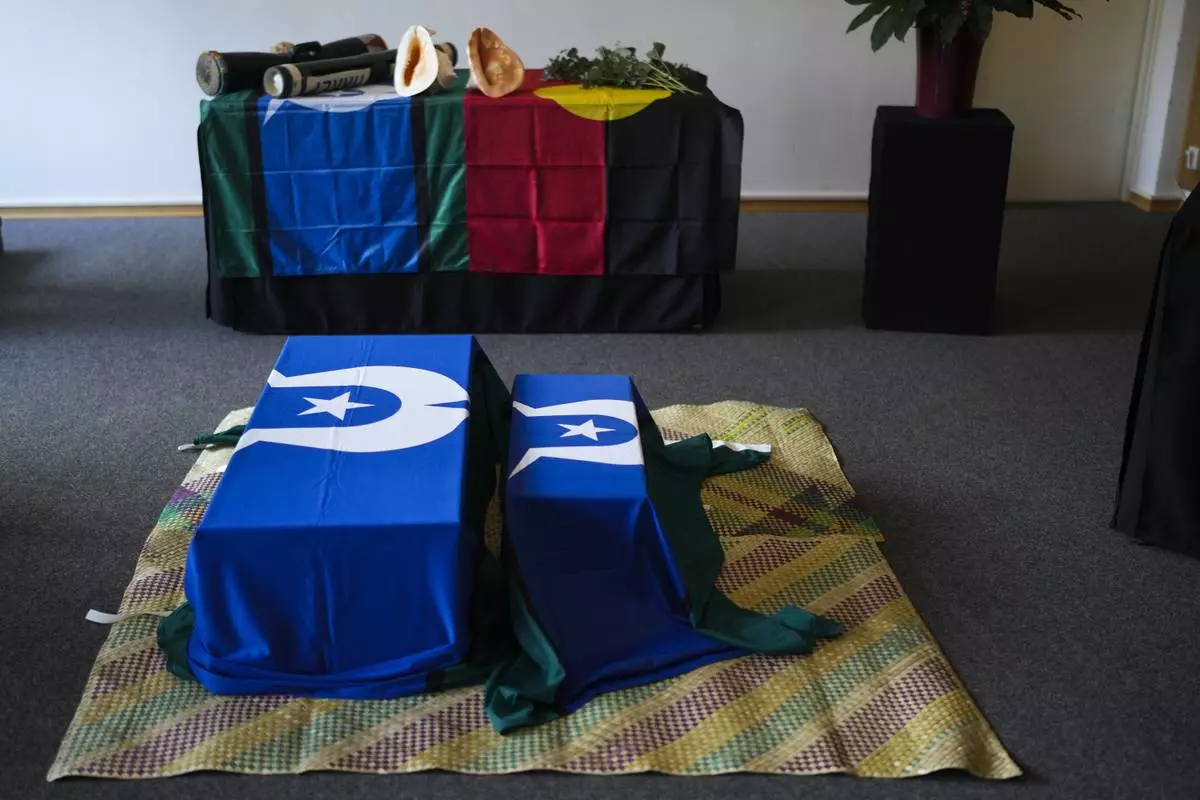
Two coffins lie on a traditional mat during a ceremony for the return of Aboriginal Australians' ancestors to their relatives and communities at the Ethnological Museum in Berlin, Germany, Thursday, Dec. 5, 2024. (AP Photo/Markus Schreiber)
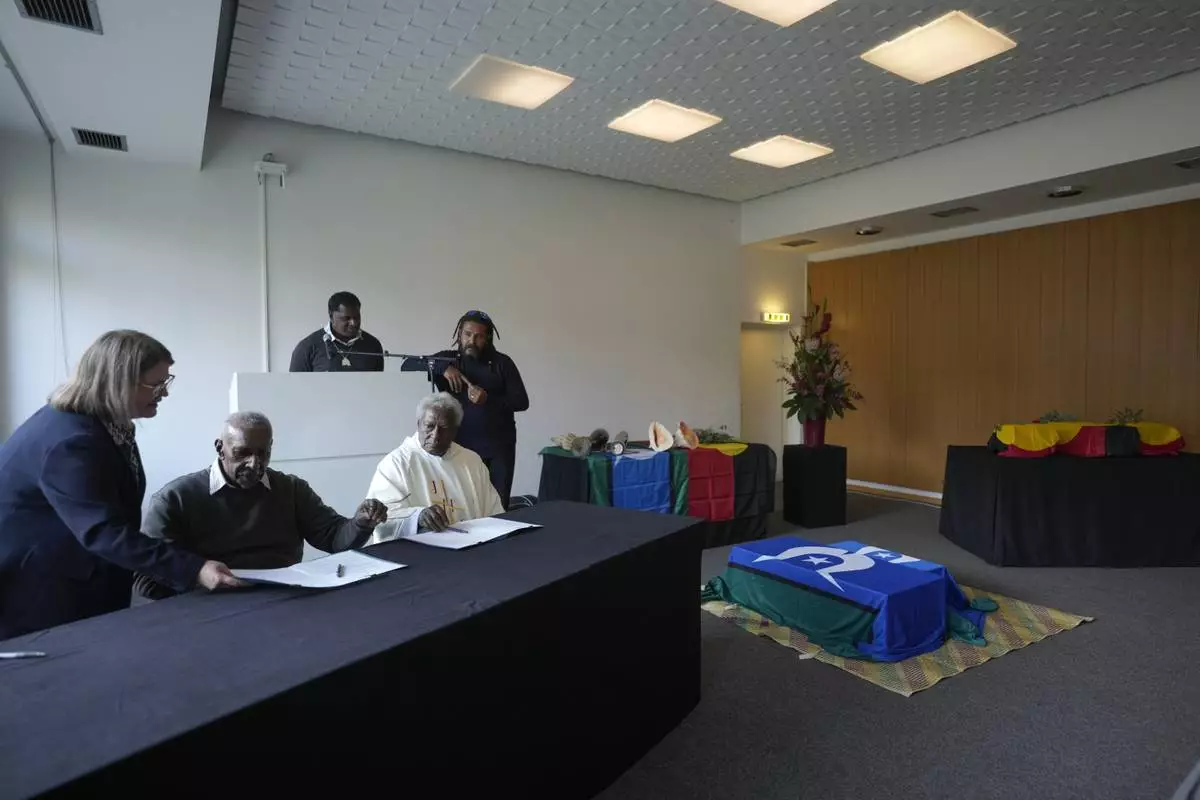
From left: The Australien Ambassador to Germany Natasha Smith and the elders from the Ugar Island, Tomson Stephen, center and Father Daniel Stephen, right, sign documents next to the coffins, during a ceremony for the return of Aboriginal Australians ancestors to their relatives and communities at the Ethnological Museum in Berlin, Germany, Thursday, Dec. 5, 2024. (AP Photo/Markus Schreiber)
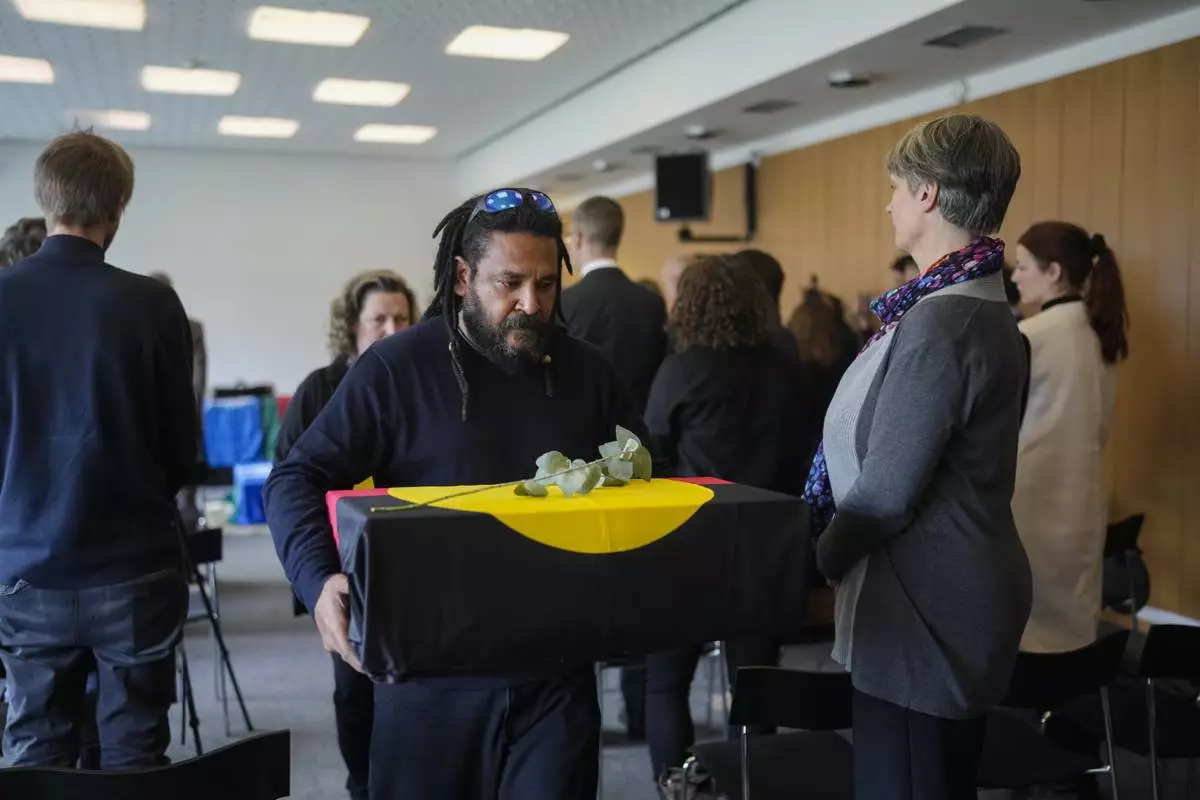
Yessie Mosby from Ugar Island in Australia carries a coffin, after a ceremony for the return of Aboriginal Australians ancestors to their relatives and communities at the Ethnological Museum in Berlin, Germany, Thursday, Dec. 5, 2024. (AP Photo/Markus Schreiber)

Yessie Mosby from Ugar Island in Australia claps on a drum during a ceremony for the return of Aboriginal Australians ancestors to their relatives and communities at the Ethnological Museum in Berlin, Germany, Thursday, Dec. 5, 2024. (AP Photo/Markus Schreiber)
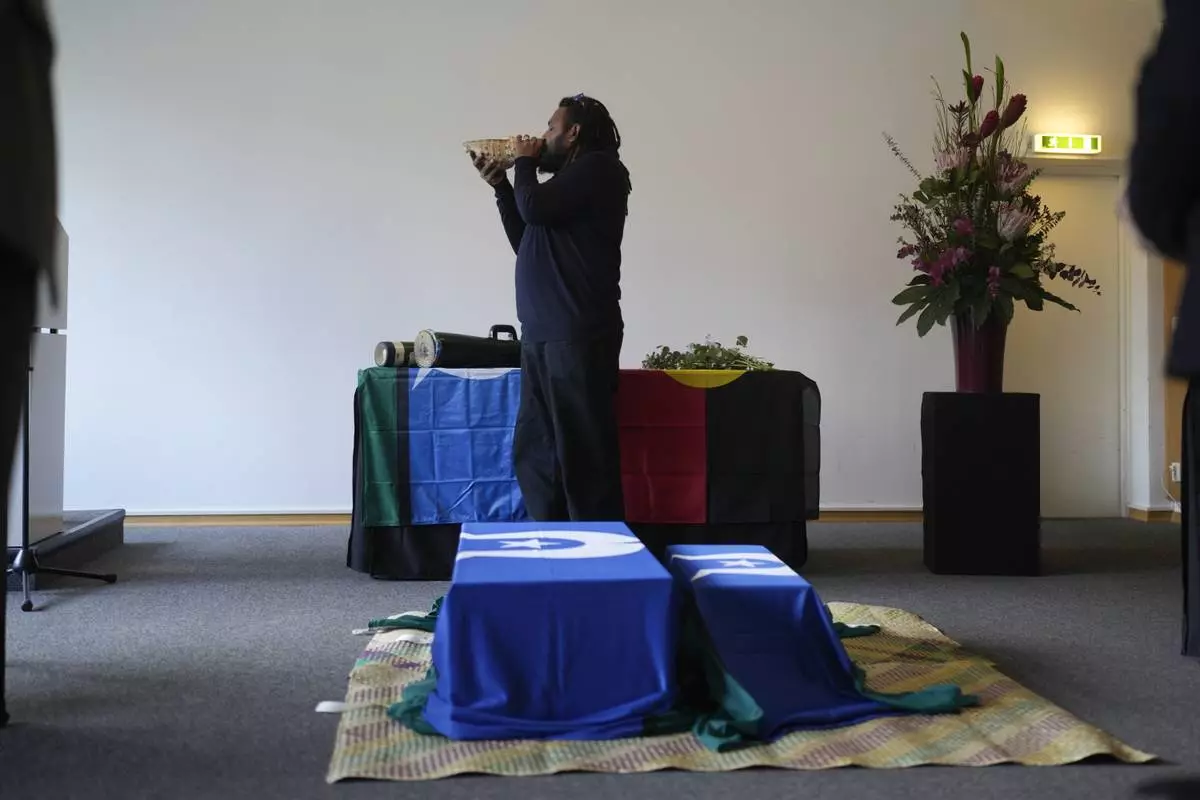
Yessie Mosby from Ugar Island in Australia blows the shell behind coffins, during a ceremony for the return of Aboriginal Australians ancestors to their relatives and communities at the Ethnological Museum in Berlin, Germany, Thursday, Dec. 5, 2024. (AP Photo/Markus Schreiber)

Father Stephen of Ugar Island, Australia, blesses coffins during a ceremony for the return of Aboriginal Australians' ancestors to their relatives and communities at the Ethnological Museum in Berlin, Germany, Thursday, Dec. 5, 2024. (AP Photo/Markus Schreiber)
SYDNEY (AP) — Organizers said Friday that two Sydney to Hobart sailors have died at sea amid wild weather conditions that forced line honors favorite Master Lock Comanche to withdraw among mass retirements.
The Cruising Yacht Club of Australia in Sydney, which administers the yacht race, has said that one sailor each on entrants Flying Fish Arctos and Bowline were killed after being struck by the boom, a large horizontal pole at the bottom of the sail.
The race will continue as the fleet continues its passage to Constitution Dock in Hobart, with the first boats expected to arrive later on Friday or early Saturday morning. The race is 628 nautical miles (722 miles, 1,160 kilometers) long.
David Jacobs, vice-commodore of the CYCA, said the race would “absolutely” continue.
"The conditions are challenging, but they’re not excessive,” he said. “So we’ve got sort of winds at about 25 knots coming from the north seas around about two meters or thereabouts, so the conditions that most of the sailors would normally easily handle.”
Australian Prime Minister Anthony Albanese paid tribute to the sailors who died.
“We have sadly awoken to tragedy in the Sydney to Hobart with the awful news two sailors have lost their lives,” he said. “Our thoughts are with the crews, their families and loved ones at this deeply sad time.”
The incident aboard Flying Fish Arctos occurred around 30 nautical miles east-southeast of Ulladulla on the New South Wales south coast. Crew members attempted CPR but could not revive their teammate.
The crew member aboard Bowline was struck approximately 30 nautical miles east/north-east of Batemans Bay and fell unconscious, with CPR also unsuccessful.
A police vessel was escorting Bowline to Batemans Bay, where she is expected to arrive later Friday morning.
“As these incidents are being dealt with by the Water Police and all family members are yet to be contacted, we cannot provide further details at this stage,” the CYCA said in a statement. “Our thoughts are with the crews, family and friends of the deceased.”
Flying Fish Arctos, a New South Wales-based 50-footer, has contested 17 previous Hobarts since being built in 2001. The boat was designed for round-the-world sailing and is currently used by Flying Fish, a sailing school that operates in Mosman, a suburb on Sydney’s north shore.
The deaths come 26 years after six sailors were killed in storms during the 1998 running of the race, which triggered a state coronial inquest and mass reforms to the safety protocols that govern the race.
The first all-Filipino crew of 15 sailors was entered in the 2024 race, but was among about 15 retirements because of the weather. With veteran sailor Ernesto Echauz at the helm, Centennial 7 was one of six international entrants and includes sailors from the Philippines’ national team and the Philippines navy.
Last year, LawConnect won line honors after holding off defending champion Comanche by less than a minute in an exciting finish between the super maxis. LawConnect, which was runner-up in the last three editions of the race, finished in 1 day, 19 hours, 3 minutes, 58 seconds. Comanche’s time was 1 day, 19 hours, 4 minutes, 49 seconds — a margin of just 51 seconds.
It was the second-closest finish in Sydney to Hobart history after Condor of Bermuda beat Apollo by seven seconds in 1982.
Comanche holds the race record of 1 day, 9 hours, 15 minutes, 24 seconds, set when it won in 2017.
LawConnect, which led out of Sydney Harbor, was leading the 2024 race but still had 400 nautical miles before reaching Hobart, indicating a finish overnight Friday night. Celestial V70 is in second place, about 10 nautical miles behind LawConnect.
AP sports: https://apnews.com/sports
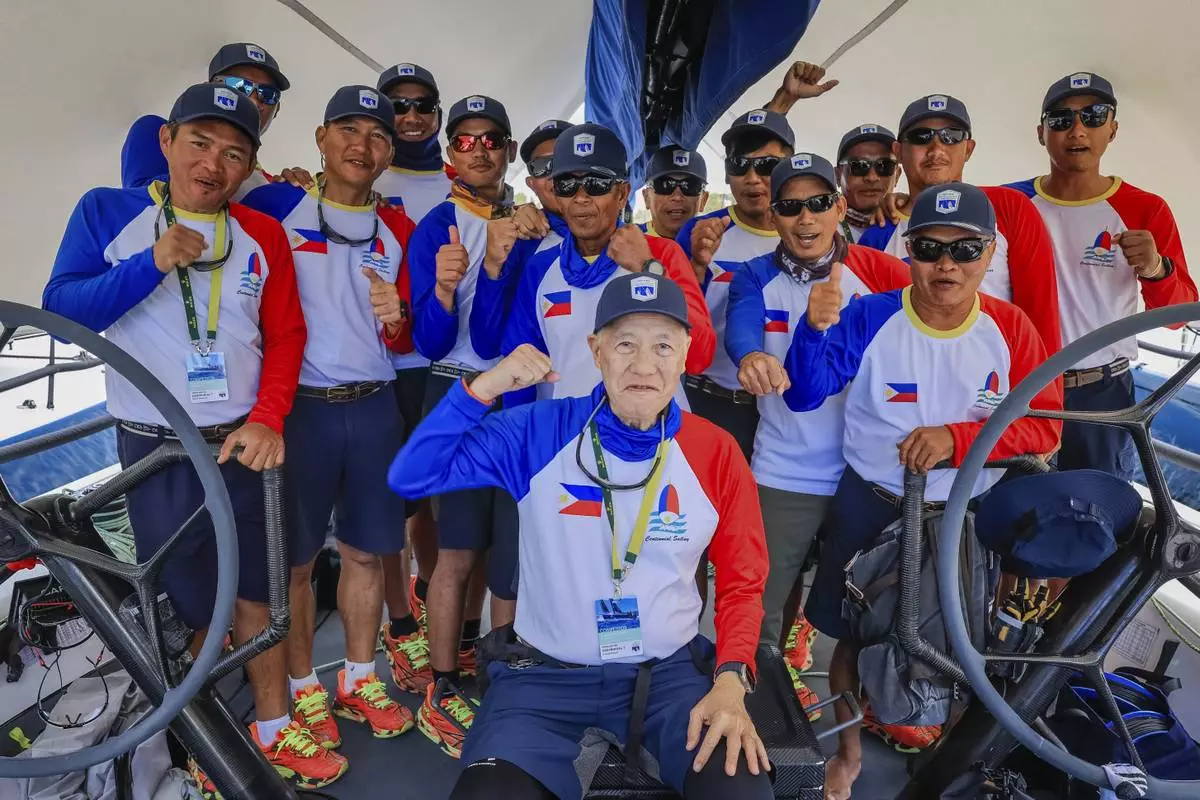
Skipper of Philippines entry Centennial, Ernesto Echauz, center, gestures with his crew ahead of the Sydney to Hobart yacht race in Sydney, Monday, Dec. 23, 2024. (Salty Dingo via AP)
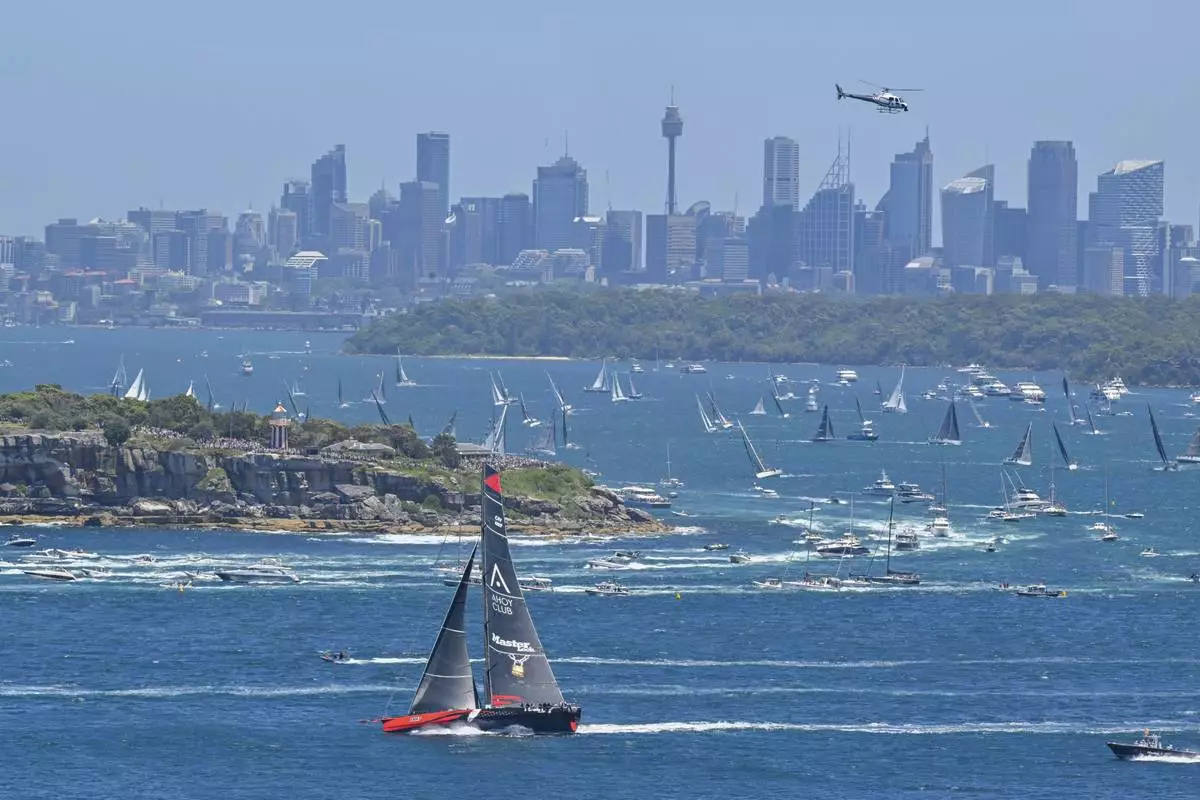
Master Lock Comanche sails out of the heads soon after the start of the Sydney to Hobart yacht race in Sydney Harbour, Thursday, Dec. 26, 2024. (Mick Tsikas/AAP Image via AP).
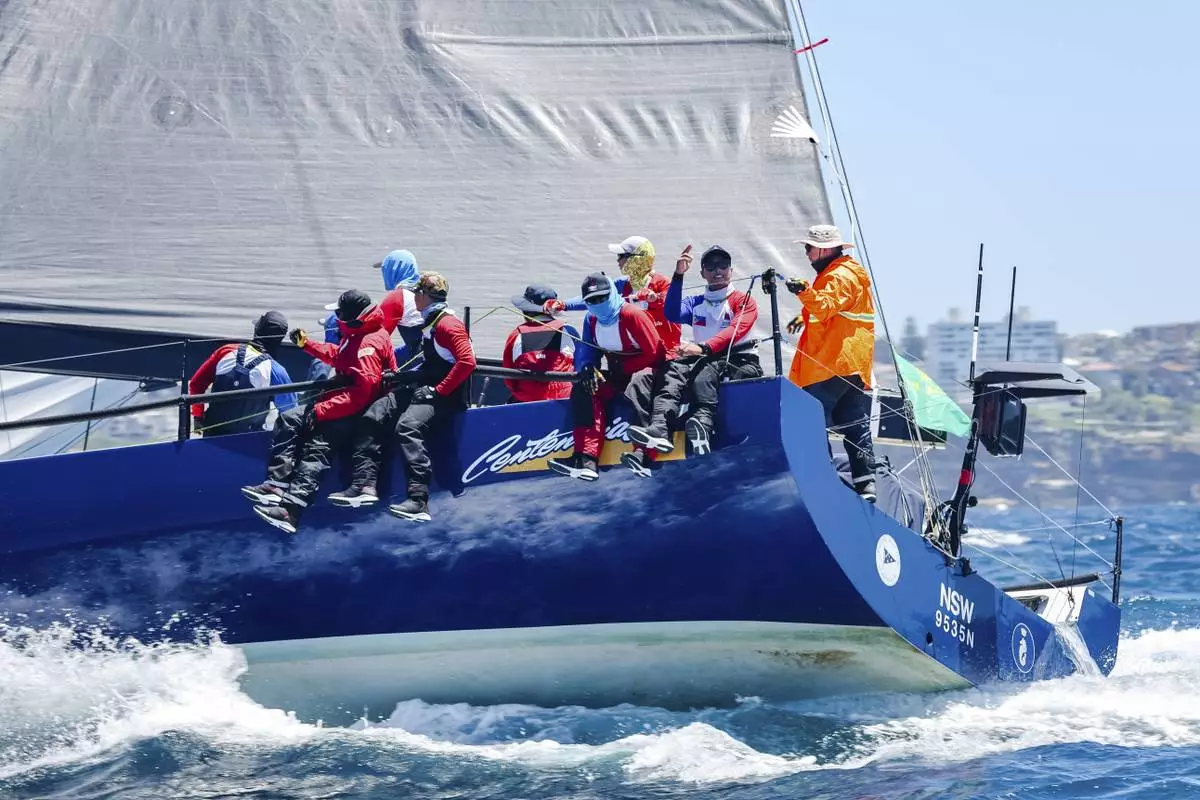
In this photo provided by Salty Dingo, Philippines entry Centennial sails towards the heads after the start of the Sydney to Hobart yacht race in Sydney, Thursday, Dec. 26, 2024. (Salty Dingo via AP)
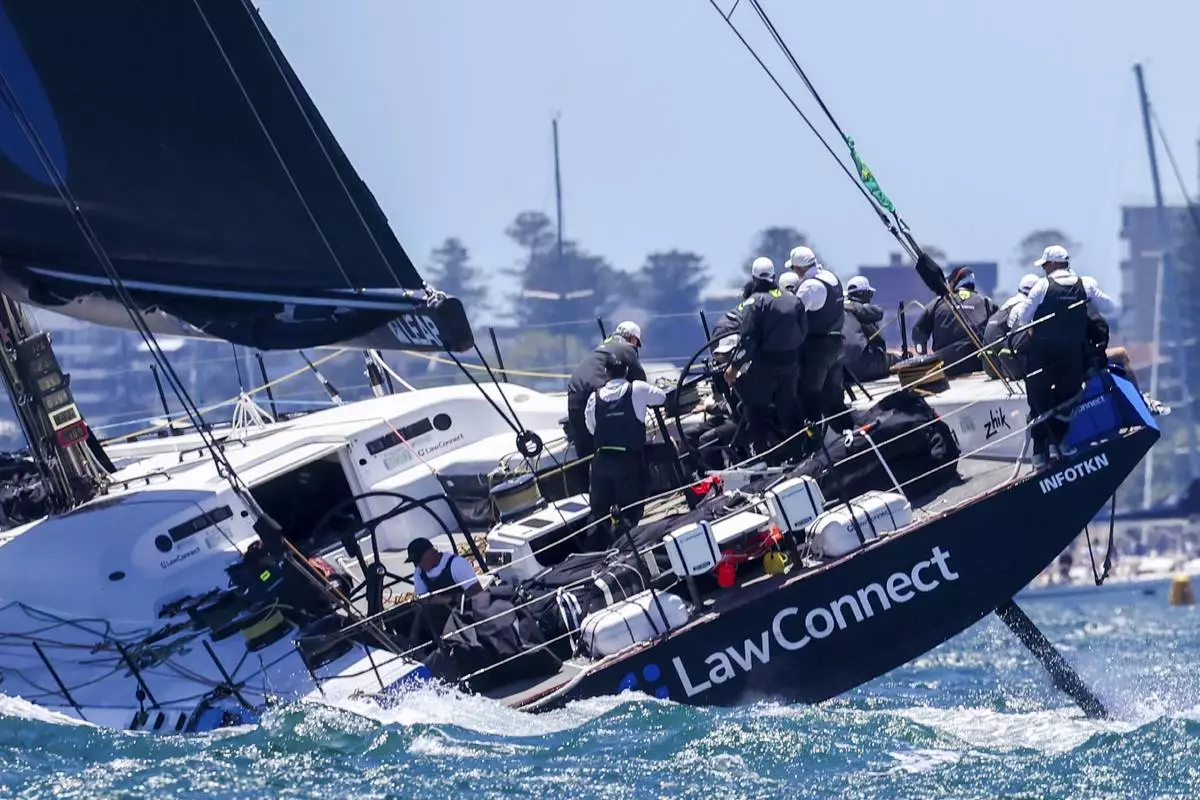
LawConnect competes at the start of the Sydney to Hobart yacht race in Sydney Harbour, Thursday, Dec. 26, 2024. (Mark Evans/AAP Image via AP).

Competitors sail out of the heads following the start of the Sydney to Hobart yacht race in Sydney, Thursday, Dec. 26, 2024. (Mark Evans/AAP Image via AP).

Master Lock Comanche, left, and LawConnect sail out of the heads following the start of the Sydney to Hobart yacht race in Sydney, Thursday, Dec. 26, 2024. (Mark Evans/AAP Image via AP).
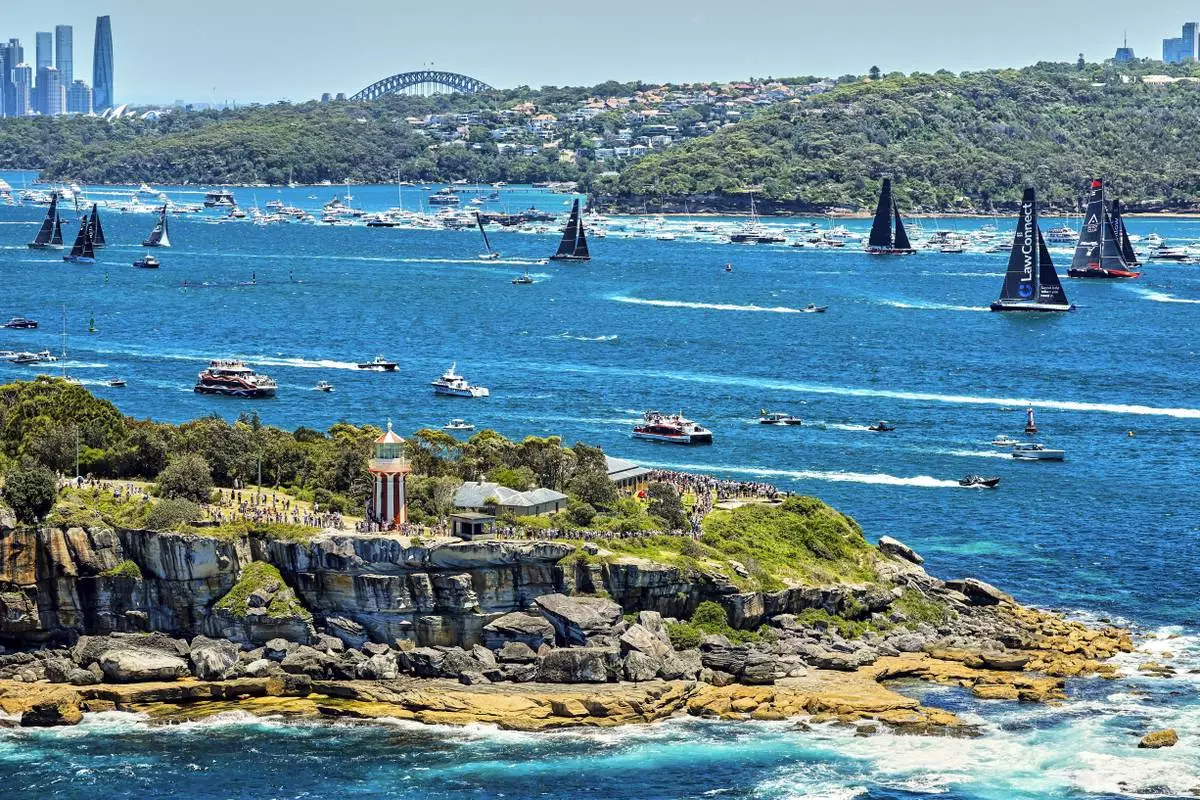
In this photo provided by Rolex, competitors sail towards the heads as they leave Sydney Harbour at the start of the Sydney to Hobart yacht race in Sydney, Thursday, Dec. 26, 2024. (Carlo Borlenghi/Rolex via AP)









